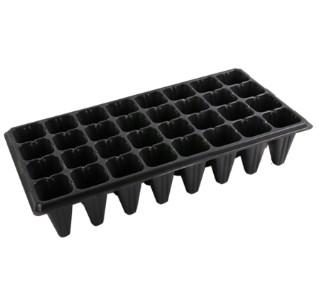The durability of plastic seed trays is a critical factor that plastic seed tray manufacturers must consider in their design and production processes. These trays are essential components in modern agriculture and horticulture, providing a stable and nurturing environment for seeds to germinate and grow into healthy seedlings. The resilience of these trays directly impacts the efficiency and sustainability of plant cultivation practices.
Plastic seed tray manufacturers are well aware of the importance of durability in their products. They employ a range of materials, including polypropylene, polystyrene, and polyethylene, which are known for their strength, flexibility, and resistance to wear and tear. The selection of the right material is the first step in ensuring that the plastic seed trays can withstand the rigors of use in various environmental conditions.
In addition to material selection, plastic seed tray manufacturers also focus on the design of their trays. The trays are often designed with specific features to enhance their durability. For instance, the trays may have reinforced edges to prevent cracking or breaking. They may also incorporate a ribbed or honeycomb structure at the bottom to provide additional strength and support for the soil and plants.
The manufacturing process itself plays a significant role in the durability of plastic seed trays. Manufacturers employ advanced techniques such as injection molding, which allows for the production of trays with uniform thickness and consistent quality. This process ensures that the trays are free from defects that could compromise their structural integrity.
Plastic seed tray manufacturers also pay close attention to the quality control measures in place. Rigorous testing and inspection procedures are implemented to ensure that each tray meets the required standards of durability. These tests may include impact resistance tests, load-bearing tests, and longevity tests to simulate the conditions the trays will face in real-world applications.
Another aspect that plastic seed tray manufacturers consider is the adaptability of their trays to different climates and environments. The trays are designed to be resistant to UV radiation, which is crucial for outdoor use where they may be exposed to sunlight for extended periods. This resistance helps to prevent the trays from becoming brittle and breaking down over time.
Furthermore, plastic seed tray manufacturers are also exploring eco-friendly alternatives to traditional plastics. The development of biodegradable and compostable seed trays is a step towards creating a more sustainable product that does not contribute to environmental pollution. These trays are made from materials such as plant-based polymers, which can break down naturally over time, reducing the environmental impact of plastic seed tray waste.
In conclusion, the durability of plastic seed trays is a multifaceted issue that plastic seed tray manufacturers address through careful material selection, innovative design, advanced manufacturing processes, and stringent quality control measures. By focusing on these aspects, manufacturers can produce trays that are not only functional and efficient but also resilient and long-lasting. This commitment to durability ensures that plastic seed trays continue to be a valuable tool in the agricultural and horticultural industries, supporting the growth and development of plants while minimizing environmental impact.


